Personnel
Dr. Ademide Adelusi-Adeluyi
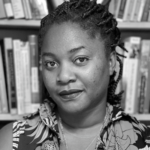 Trained as both historian and computer engineer, Dr. Adelusi-Adeluyi’s research into the history of African cities combines a set of interdisciplinary interests in African and urban history, technology, cartography and spatial humanities. She joined UCR’s History department as an Assistant Professor in July 2015 and received her PhD in History from NYU in 2016. Her current book project, “Imagine Lagos: Speculative Maps and the Making of a Nineteenth Century West African City,” is a spatial history of Lagos between 1845 and 1868, one that takes into account the city’s role as the economic, political and cultural focal point of the Bight of Benin.
Trained as both historian and computer engineer, Dr. Adelusi-Adeluyi’s research into the history of African cities combines a set of interdisciplinary interests in African and urban history, technology, cartography and spatial humanities. She joined UCR’s History department as an Assistant Professor in July 2015 and received her PhD in History from NYU in 2016. Her current book project, “Imagine Lagos: Speculative Maps and the Making of a Nineteenth Century West African City,” is a spatial history of Lagos between 1845 and 1868, one that takes into account the city’s role as the economic, political and cultural focal point of the Bight of Benin.
Dr. Jody Benjamin
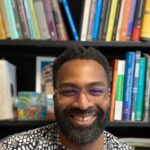 Jody Benjamin is a historian of 18th and 19th century Western Africa, where his research focuses on social and cultural history through the lens of of material culture, consumption, and dress. His work in Senegal, Mali and Guinea charts the region’s integration into a global economy dominated by capitalist networks and colonial logics.
Jody Benjamin is a historian of 18th and 19th century Western Africa, where his research focuses on social and cultural history through the lens of of material culture, consumption, and dress. His work in Senegal, Mali and Guinea charts the region’s integration into a global economy dominated by capitalist networks and colonial logics.
Trained as a historian in the Department of African and African American Studies at Harvard, Dr. Benjamin’s work has been supported by the National Endowment for the Humanities (NEH), the University of California Regents, University of California Humanities Research Initiative (UCHRI), the Hellman Fellows Fund, and the John Carter Brown Library at Brown University. He is the lead project investigator for “Unarchiving Blackness,” a 2022-2023 Mellon Sawyer Seminar on archival practices in African and African Diaspora Studies.
He is also a 2022 co-Convenor of the Humanities Across Borders “Textiles and Dyes as Transnational, Global Knowledge,” an international graduate school at Leiden University, the Netherlands. Dr. Benjamin has published chapters in two edited volumes, Dressing Global Bodies: the Political Power of Dress in World History (Routledge, 2019) and in Creating African Fashion Histories: Politics, Museums and Sartorial Practices (Indiana University Press, 2022). His research monograph, The Texture of Change: Dress, Pluralism and History in Western Africa, 1700-1850, is under contract with Ohio University Press New African History Series. He is Assistant Professor of History at the University of California, Riverside, where he teaches classes on Africa and African Diasporas.
Dr. andré carrington
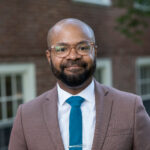 Dr. carrington is Associate Professor of English at UC Riverside. He is a scholar of race, gender, and genre in Black and American cultural production. His first book, “Speculative Blackness: The Future of Race in Science Fiction,” interrogates the cultural politics of race in the fantastic genres through studies of science fiction fanzines, comics, film and television, and other speculative fiction texts. He is a past recipient of fellowships from the Radcliffe Institute for Advanced Study at Harvard University and the Penn Humanities Forum at the University of Pennsylvania (now the Wolf Center for Humanities).
Dr. carrington is Associate Professor of English at UC Riverside. He is a scholar of race, gender, and genre in Black and American cultural production. His first book, “Speculative Blackness: The Future of Race in Science Fiction,” interrogates the cultural politics of race in the fantastic genres through studies of science fiction fanzines, comics, film and television, and other speculative fiction texts. He is a past recipient of fellowships from the Radcliffe Institute for Advanced Study at Harvard University and the Penn Humanities Forum at the University of Pennsylvania (now the Wolf Center for Humanities).
Dr. Ayana Flewellen
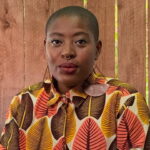 Dr. Flewellen is a Black Feminist, an archaeologist, a storyteller, an artist scholar, and an Assistant Professor in the Department of Anthropology at UC Riverside. As a scholar of anthropology and African and African Diaspora Studies, Flewellen’s intellectual genealogy is shaped by critical theory rooted in Black feminist epistemology and pedagogy. This epistemological backdrop not only constructs the way she designs, conducts and produces her scholarship but acts as foundational to how she advocates for greater diversity within the field of archaeology and within the broader scope of academia. Flewellen is the co-founder and current President of the Society of Black Archaeologists and sits on the Board of Diving With A Purpose.
Dr. Flewellen is a Black Feminist, an archaeologist, a storyteller, an artist scholar, and an Assistant Professor in the Department of Anthropology at UC Riverside. As a scholar of anthropology and African and African Diaspora Studies, Flewellen’s intellectual genealogy is shaped by critical theory rooted in Black feminist epistemology and pedagogy. This epistemological backdrop not only constructs the way she designs, conducts and produces her scholarship but acts as foundational to how she advocates for greater diversity within the field of archaeology and within the broader scope of academia. Flewellen is the co-founder and current President of the Society of Black Archaeologists and sits on the Board of Diving With A Purpose.
Dr. Jade Sasser
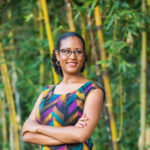 Dr. Sasser Dr. Jade S. Sasser is an Associate Professor in the Department of Gender & Sexuality Studies at UC Riverside. Her work explores how environmental problems such as climate change and toxic exposures intersect with race and gender—specifically, the bodies, health, rights, and reproductive justice of women of color. Her first book, On Infertile Ground: Population Control and Women’s Rights in the Era of Climate Change, was published in 2018 by NYU Press, and received the Emory Elliott book award. Currently Dr. Sasser has two ongoing research projects: one focusing on gender, cookstoves, and household energy use in Africa and Asia; and the other, exploring how racial inequality shapes climate change-related emotions, reproductive plans, and visions of the future.
Dr. Sasser Dr. Jade S. Sasser is an Associate Professor in the Department of Gender & Sexuality Studies at UC Riverside. Her work explores how environmental problems such as climate change and toxic exposures intersect with race and gender—specifically, the bodies, health, rights, and reproductive justice of women of color. Her first book, On Infertile Ground: Population Control and Women’s Rights in the Era of Climate Change, was published in 2018 by NYU Press, and received the Emory Elliott book award. Currently Dr. Sasser has two ongoing research projects: one focusing on gender, cookstoves, and household energy use in Africa and Asia; and the other, exploring how racial inequality shapes climate change-related emotions, reproductive plans, and visions of the future.
Utitofon Inyang
 Utitofon Inyang is a Doctoral Candidate in the Department of Comparative Literature. She is a member of the African Studies Association Emerging Scholars Network Executive Committee and the Vice-Chair of the African Literature Association Graduate Student Caucus.
Utitofon Inyang is a Doctoral Candidate in the Department of Comparative Literature. She is a member of the African Studies Association Emerging Scholars Network Executive Committee and the Vice-Chair of the African Literature Association Graduate Student Caucus.
Utitofon holds a B.A. (English) from University of Uyo (Nigeria), and an M.A.(Literature-in-English) from University of Ilorin (Nigeria). Her research interests intersect 20th Century to present day West African Anglophone literature and culture, Critical Theory, Global Anglophone Literatures, and Digital Humanities.
Her dissertation, “Like a Mask Dancing: Visuospatial Geographies in West African Anglophone Literature” uses a specific instance of West African indigenous culture –masquerade performance – as a critical framework to examine questions of space and subjectivity, epistemology, and cultural ecologies in the works of contemporary African and Afro-diasporic writers like Chinua Achebe, Wole Soyinka, Teju Cole, and Chimamanda Adichie. This study draws insights from multiple disciplines to arrive at a reading methodology – visuospatiality – that attends to the textual atlas of black lifeworlds, showing how writers distill visual and spatial networks from indigenous African thought into literary form. Overall, Utitofon’s work takes into serious account the worlding practices that underpin African literary archives and makes the case for centering African geographies, cultures, and subjectivities as the theoretical basis for reading African literature.
Grecia Perez
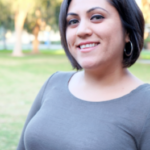 This project centers the (il)legibility of the Black experience in the Costa Chica region of the Mexican Pacific Coast, by looking at the limits and opportunities to development and environmental impacts that Afro-descendants are experiencing. Previous and current ethnographic fieldwork have demonstrated that social movements defending natural resources in Mexico are not available as a strategy to Afro-Mexicans as it may be available to mestizos or indigenous groups. I focus on what are the limits and opportunities available to the people who live in Black villages and propose understanding nearby waterscapes (river, lagoons, and the ocean) as an archive. This archive intends to understand multiple narratives that circle back and center narratives of Black life in relation to national and global discourses of conservation, development, and human rights. My dissertation will highlight where boundaries are drawn by different factors and how such boundaries can unveil what seems murky, unclear, and incomplete in Mexico.
This project centers the (il)legibility of the Black experience in the Costa Chica region of the Mexican Pacific Coast, by looking at the limits and opportunities to development and environmental impacts that Afro-descendants are experiencing. Previous and current ethnographic fieldwork have demonstrated that social movements defending natural resources in Mexico are not available as a strategy to Afro-Mexicans as it may be available to mestizos or indigenous groups. I focus on what are the limits and opportunities available to the people who live in Black villages and propose understanding nearby waterscapes (river, lagoons, and the ocean) as an archive. This archive intends to understand multiple narratives that circle back and center narratives of Black life in relation to national and global discourses of conservation, development, and human rights. My dissertation will highlight where boundaries are drawn by different factors and how such boundaries can unveil what seems murky, unclear, and incomplete in Mexico.
Abdulbasit Kassim
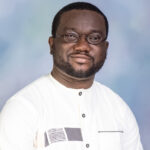 I am an interdisciplinary historian of West Africa and the African Diaspora with a focus on Islam and Muslim societies from the seventeenth century to the present. My research investigates questions about continuities, discontinuities, ruptures, and changes in the history of ideas that have fundamentally shaped past and present societies and peoples across time and space in their varied and situated cultural, social, political, economic, and material histories, placing Africa at the center of the narrative. In my research, I trace the ebbs and flows of African ideas on slavery, colonialism, religion, power, knowledge, empire, nation, state, race, ethnicity, citizenship, warfare, gender, and sexuality. I am currently working on my first single-authored book tentatively entitled Old Reformers, New Dissidents: Continuity and Change in the Intellectual History of Jihad and Traditions of Reform in Muslim West Africa. This book examines the continuities and changes in the longue durée of successive waves of Islamic reform, counter-reform, dissidence, rebellion, and jihad in Muslim West Africa. I received my PhD at Rice University. Prior to my PhD, I was a Predoctoral Fellow at the Institute for the Study of Islamic Thought in Africa and the Program of African Studies at Northwestern University.
I am an interdisciplinary historian of West Africa and the African Diaspora with a focus on Islam and Muslim societies from the seventeenth century to the present. My research investigates questions about continuities, discontinuities, ruptures, and changes in the history of ideas that have fundamentally shaped past and present societies and peoples across time and space in their varied and situated cultural, social, political, economic, and material histories, placing Africa at the center of the narrative. In my research, I trace the ebbs and flows of African ideas on slavery, colonialism, religion, power, knowledge, empire, nation, state, race, ethnicity, citizenship, warfare, gender, and sexuality. I am currently working on my first single-authored book tentatively entitled Old Reformers, New Dissidents: Continuity and Change in the Intellectual History of Jihad and Traditions of Reform in Muslim West Africa. This book examines the continuities and changes in the longue durée of successive waves of Islamic reform, counter-reform, dissidence, rebellion, and jihad in Muslim West Africa. I received my PhD at Rice University. Prior to my PhD, I was a Predoctoral Fellow at the Institute for the Study of Islamic Thought in Africa and the Program of African Studies at Northwestern University.